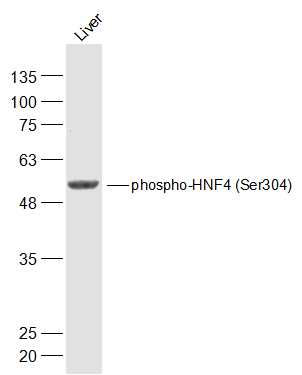产品货号 : mlR8451
英文名称 : phospho-HNF4 (Ser304)
中文名称 : 磷酸化肝细胞核因子4α抗体
别 名 : HNF4(Phospho-Ser304); Hepatic nuclear factor 4 alpha; Hepatocyte nuclear factor 4 alpha; Hepatocyte nuclear factor 4; HNF 4 alpha; HNF 4; HNF4; HNF4A; HNF4a7; HNF4a8; HNF4a9; Hnf4alpha; MODY 1; MODY; MODY1; NR2A1; NR2A21; Nuclear receptor subfamily 2 group A member 1; TCF 14; TCF; TCF14; Tcf4; Transcription factor 14, hepatic nuclear factor; Transcription factor 14; Transcription factor HNF 4; Transcription factor HNF4; HNF4A_HUMAN.
产品类型 : 磷酸化抗体
研究领域 : 肿瘤 细胞生物 免疫学 染色质和核信号 信号转导 转录调节因子 激酶和磷酸酶
抗体来源 : Rabbit
克隆类型 : Polyclonal
交叉反应 : Human, Mouse, Rat, Chicken, Pig, Cow, Horse, Rabbit, Guinea Pig, Danio rerio
产品应用 : WB=1:500-2000 ELISA=1:500-1000 IHC-P=1:400-800 IHC-F=1:400-800 IF=1:50-200 (石蜡切片需做抗原修复)
not yet tested in other applications.
optimal dilutions/concentrations should be determined by the end user.
分 子 量 : 52kDa
细胞定位 : 细胞核
性 状 : Lyophilized or Liquid
浓 度 : 1mg/ml
免 疫 原 : KLH conjugated Synthesised phosphopeptide derived from human HNF4 alpha around the phosphorylation site of Ser304:GL(p-S)DP
亚 型 : IgG
纯化方法 : affinity purified by Protein A
储 存 液 : 0.01M TBS(pH7.4) with 1% BSA, 0.03% Proclin300 and 50% Glycerol.
保存条件 : Store at -20 °C for one year. Avoid repeated freeze/thaw cycles. The lyophilized antibody is stable at room temperature for at least one month and for greater than a year when kept at -20°C. When reconstituted in sterile pH 7.4 0.01M PBS or diluent of antibody the antibody is stable for at least two weeks at 2-4 °C.
PubMed : PubMed
产品介绍 : The protein encoded by the HNF4 gene is a nuclear transcription factor which binds DNA as a homodimer. The encoded protein controls the expression of several genes, including hepatocyte nuclear factor 1 alpha, a transcription factor which regulates the expression of several hepatic genes. This gene may play a role in development of the liver, kidney, and intestines. Mutations in this gene have been associated with monogenic autosomal dominant non insulin dependent diabetes mellitus type I. At least three different transcript variants encoding three different isoforms have been found for this gene.
Function:
Transcriptionally controlled transcription factor. Binds to DNA sites required for the transcription of alpha 1-antitrypsin, apolipoprotein CIII, transthyretin genes and HNF1-alpha. May be essential for development of the liver, kidney and intestine.
Subunit:
Homodimerization is required for HNF4-alpha to bind to its recognition site.
Subcellular Location:
Nucleus.
Post-translational modifications:
Phosphorylated on tyrosine residue(s); phosphorylation is important for its DNA-binding activity. Phosphorylation may directly or indirectly play a regulatory role in the subnuclear distribution. Phosphorylation at Ser-313 by AMPK reduces the ability to form homodimers and bind DNA.
Acetylation at Lys-458 lowers transcriptional activation by about two-fold.
DISEASE:
Defects in HNF4A are the cause of maturity-onset diabetes of the young type 1 (MODY1) [MIM:125850]; also symbolized MODY-1. MODY is a form of diabetes that is characterized by an autosomal dominant mode of inheritance, onset in childhood or early adulthood (usually before 25 years of age), a primary defect in insulin secretion and frequent insulin-independence at the beginning of the disease.
Similarity:
Belongs to the nuclear hormone receptor family. NR2 subfamily.
Contains 1 nuclear receptor DNA-binding domain.
SWISS:
P41235
Gene ID:
3172
Important Note:
This product as supplied is intended for research use only, not for use in human, therapeutic or diagnostic applications.
产品图片












